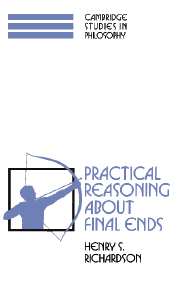IV - Specifying ends
Published online by Cambridge University Press: 05 June 2012
Summary
The last chapter's conclusion that deliberation is of ends may be thought a purely verbal victory. “Yes,” it may be admitted, “there is no contradiction in saying that we can deliberate about or ‘of’ ends; but that does not mean that deliberation that modifies ends can be rational.” While Part Three will show how deliberation of ends can be rationally constrained, we first need to confront the pseudo-Humean side of the scope obstacle, which gives the fundamental philosophical motivation for thinking that deliberation cannot rationally determine ends. Having accepted a generalized internalism about reasons for action, I cannot take a dismissive way with this opponent.
SPECIFICATION DEFINED
This section will define the relation of specification, as it holds between two ends or norms, which will be seen to mark out an alternative both to deductive application of a rule and to end–means reasoning. As we saw in §5, the hope that practical reasoning might be given a deductive reconstruction is a chimerical distraction. Once we fully accept that a deductive approach is not available, it becomes open to us to recognize that the ends and norms with which we begin are not “absolute” in logical form. By this I mean that they need not be strictly universal with respect to the domain of possible acts the way the major premise of a Peripatetic syllogism (defined in §5) must be.
- Type
- Chapter
- Information
- Practical Reasoning about Final Ends , pp. 69 - 86Publisher: Cambridge University PressPrint publication year: 1994



